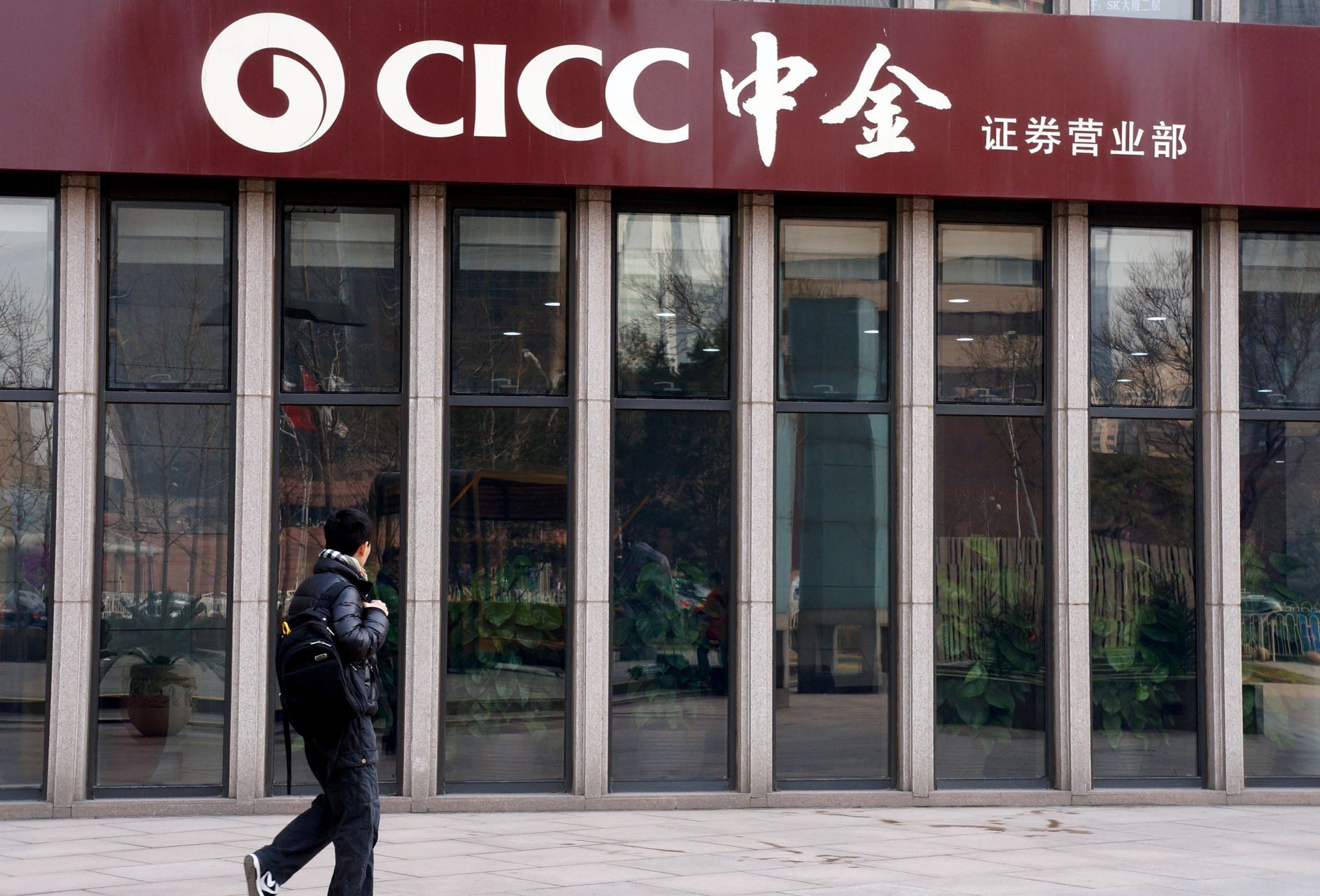Early CICC Backer Trims Stake as Profit Shrinks for First Time in Six Years

Haier, which once owned about 10% of China’s oldest western-style investment bank, disclosed it has cut its stake to 6.32%
Key Takeaways:
- Appliance giant Haier has cut its longtime stake in CICC, which is set to post its first annual profit decline since China’s market crash of 2016
- Future growth for China’s leading investment bank is being constrained by geopolitical tensions and capital requirements
By Shen Ruzhen
Ahead of China International Capital Corp.’s (CICC) (3908.HK; 601995.SH) highly anticipated Shanghai listing in late 2020, an investment vehicle of home appliance maker Haier bought a nearly 10% stake in China’s oldest investment bank. The long romance between the pair now appears to be winding down, with Haier Group (Qingdao) Jinying Holding Co. disclosing late last week that it completed a share reduction plan by cutting its stake to 6.32%, from a previous 8.26%.
Haier Jinying tried to play down the sale, attributing it to its own internal need for cash. And it’s true that such sales by pre-IPO investors aren’t uncommon several years later as they look to pocket some of their gains. Still, the move points to cooler sentiment towards Chinese investment banks compared with just two years ago.
On Nov. 2, 2020, when CICC debuted in Shanghai, complementing its older Hong Kong listing, bullish investors pumped up its shares by as much as the maximum 44% limit on its debut day. They were lured by CICC’s rising profile in the global rankings, fueled by its lead underwriting role for Ant Group’s planned $37 billion IPO, which at the time was set to become the world’s biggest.
But just a day later, China blocked the Ant listing, marking the start of a sweeping series of regulatory crackdowns on sectors ranging from big tech to private tutoring. Concurrent tighter scrutiny of offshore listings by Chinese companies sent a chill through a market that was one of CICC’s biggest cash cows.
Today, CICC’s Shanghai-listed shares have lost more than half of their value from an early 2021 peak, even after a recent rebound. Its Hong Kong-traded shares also hit a six-year low in late October before rebounding, as the bank heads toward its first annual decline in both revenue and profit since China’s big market crash of 2016.
CICC’s tumbling share price partly reflects a range of macro factors, including an investment banking industry grappling with a pandemic-ravaged economy, withering stock markets and the threat of intensified foreign competition. But its woes are also company-specific, reflecting unique challenges facing a company seen as China’s most internationally-oriented investment bank, which once counted Morgan Stanley (MS.US) as a partner and major shareholder.
CICC’s global ambition is being clouded by heightened geopolitical tensions, and lingering concerns over a potential decoupling between U.S. and Chinese capital markets. Meanwhile, its expansion is also being stymied by the need to maintain certain capital adequacy levels as it plans new share placements worth billions of dollars.
All that said, CICC remains one of China’s biggest and most innovative investment banks, standing alongside top-tier domestic rivals such as Citic Securities (6030.HK; 600030.SH) and Haitong Securities (6837.HK; 600837.SH). China’s ninth biggest securities firm by total assets, CICC is less vulnerable to market turbulence than smaller rivals, with a more diversified portfolio ranging from relatively stable wealth and asset management, to more cyclical brokerage and proprietary trading.
Covid, Ukraine headwinds
Despite its relatively strong positioning over the longer-term, headwinds over the shorter-term were obvious in CICC’s latest quarterly financial report. Its revenue for the first nine months of 2022 dropped 10.6% from a year earlier to 19.39 billion yuan ($2.78 billion), while its net profit fell 19.3% to 6 billion yuan.
The biggest drags came from CICC’s brokerage and investment business, whose revenue fell 17.5%, and 38%, respectively, during the period. Those declines were moderated by a 13% rise in investment banking revenue, thanks to Beijing’s stepped-up use of capital markets to aid economic recovery and boost China’s tech capabilities.
Analysts expect CICC to post a net profit decline of 15% to 20% for the year, marking its first annual decline since its profit fell by 7% in 2016 during a major correction for China’s stock markets.
China’s benchmark CSI300 Index plunged more than 20% in the first nine months of this year amid widespread Covid lockdowns and other control measures that hit the economy. Foreign capital flight in the wake of the Russia-Ukraine war that erupted in February also contributed to the slide.
Despite all the headwinds, China’s IPO market is actually set to post 5% growth this year, as Chinese companies raised a record 610 billion yuan, contributing to nearly half of IPO fundraising globally, according to an estimate by KPMG. By comparison, the U.S. IPO market is expected to plunge more than 90%, while Hong Kong shrank by over 70%, underscoring the dampening effect of aggressive U.S. monetary tightening.
China’s 140 securities companies posted a 17% slump in combined revenue in the first nine months of 2023, worse than CICC’s 10.6% decline, according to industry data. The crowded industry is also expected to face growing competition from global rivals, after China scrapped foreign ownership caps for the sector in 2020. That allowed firms like Morgan Stanley, Goldman Sachs and Credit Suisse to take full control of their China business.
As China’s oldest western-style investment bank established as a China-U.S. joint venture in 1995, CICC has had plenty of time to learn to “play with the wolves.” Its global network includes operations in Hong Kong, New York, London, Singapore, San Francisco, Frankfurt and Tokyo, and it has played a key role in helping Chinese companies raise capital overseas.
Even with Chinese offshore listings largely stalled for the last 18 months, CICC still generates about one-fifth of its revenue outside China. In that regard, future growth for its non-China operations will hinge on geopolitics. While CICC and other underwriters of U.S. IPOs for Chinese companies got a boost with signs of easing tensions last week, it’s still unclear how China will implement its own new vetting mechanism for such offshore listings.
CICC has positioned itself for businesses in alternative listing venues, including Switzerland and Frankfurt, under China’s expanded “Shanghai-London Connect” scheme. But none compares with New York in terms of deal size and market liquidity.
The investment bank, which is near a regulatory ceiling in terms of its debt ratio levels, has unveiled plans to raise up to 27 billion yuan through new share placements to help fund its growth. As markets bounce back and CICC expands, Citic Securities expects CICC to achieve profit grow of 32% in 2023, and 10% in 2024, reversing this year’s decline. Still, that’s far less than the 50% profit growth in 2021, and 70% in 2020.
CICC’s Shanghai-listed shares currently trade at a price-to-book (P/B) ratio of roughly 1.6 times, higher than the sector average of around 1.4, suggesting its growth prospects may already be priced into the stock. That may partly explain Haier’s recent decision to cash out. But we should also note its Hong Kong shares trade at a much lower ratio of 0.7, reflecting greater skepticism toward the company among international investors.
To subscribe to Bamboo Works weekly free newsletter, click here






